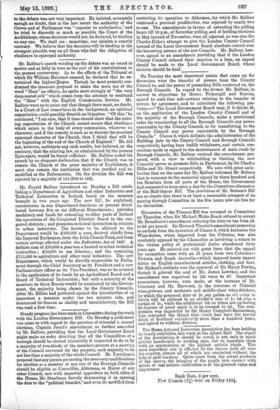Mr. Balfour's speech winding up the debate was as sound
in matter and as lofty in tone as the rest of his contributions to the present controversy. As to the effects of the Tribunal at which Sir William Harcourt sneered, he declared that he en- tertained the highest■Plopes. Though he most properly cell- deraned the insensate proposal to make the mere use of the word "Mass" an Offence, he spoke most strongly of "the very deep-seated evil " which comes from the attempt to confound the " MAAR " with the English Communion Service. Mr. Balfour went On to point out that though there must, no doubt, be a Court of Law somewhere in the background, no spiritual organisation could possibly flourish on litigation. "Of this," he continued, "I am sure, that if time should show that the exist- ing organisation of the Church cannot secure that obedience which exists in the body of every communion, whatever its character, and if the remedy is such as to destroy the practical episcopal character of the Church, then I think that will be the beginning of the end of the Church of England." He did not, however, anticipate any such results, but believed, on the contrary, that the existing law, as administered by the present Episcopate, would be found sufficient. Mr. Balfour ended hit speech by an eloquent declaration that if the Church was to remain the Church of the great majority of Englishmen, it must also remain the institution that !was purified and re- modelled at the Reformation. On the division the Bill was rejected by a majority of 154 (310 to 156).






































 Previous page
Previous page